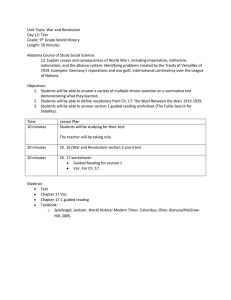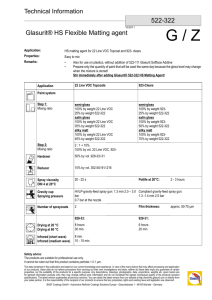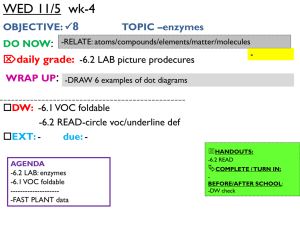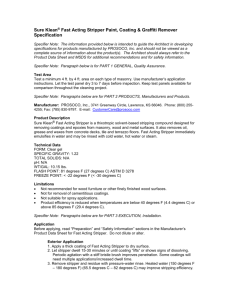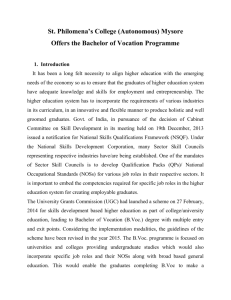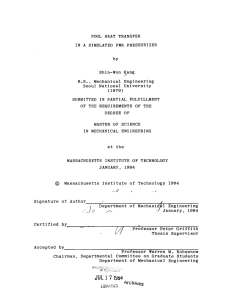Determining The Correct Concentrations of VOC IN Cooling Tower
advertisement
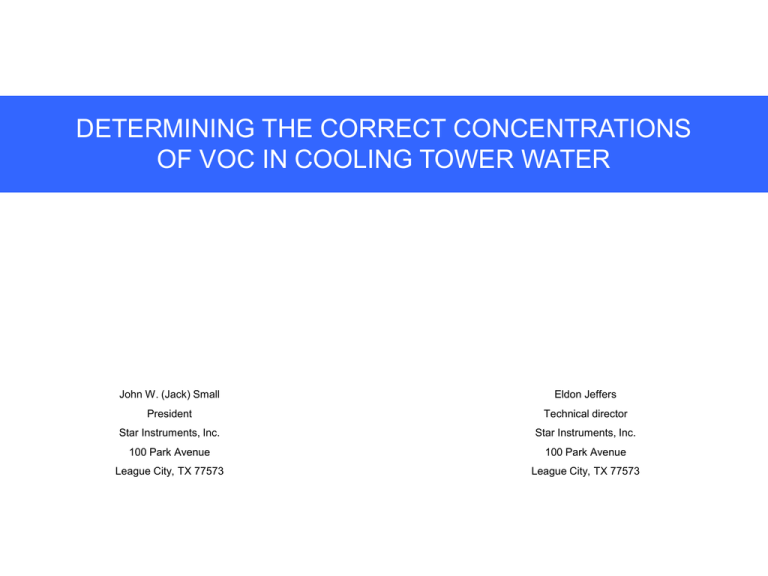
DETERMINING THE CORRECT CONCENTRATIONS OF VOC IN COOLING TOWER WATER John W. (Jack) Small Eldon Jeffers President Technical director Star Instruments, Inc. Star Instruments, Inc. 100 Park Avenue 100 Park Avenue League City, TX 77573 League City, TX 77573 TCEQ – Chapter 115 Rules Revised 10/22/03 1. Continuously monitor Total HRVOCs, at least every 15 minutes (cooling towers and flares). 2. If use a Total HRVOC Analyzer: • No on-line speciation is required • Total HRVOC reporting satisfies rules 3. If use a GC Analyzer: • Report total HRVOC. • When 50 ppbw total VOC is exceeded for over one hour; report speciated HRVOC. 4. System MDL must be no greater than 10 ppbw 5. Record analyzer “up-time”: • If a malfunction exceeds 8 consecutive hours, must sample & lab speciate within 24 hours of failure & daily thereafter until analyzer is repaired. 6. QA Plan/Test Program – due in “sufficient” time for agency approval before equipment purchase (180 day TCEQ approval cycle, including resubmissions). If submitted after 4/30/05 & Agency issues a deficiency notice in 180 days, no relief for compliance by 12/31/05. 7. 12/31/05 – Monitoring systems operational, including validated, defensible reporting. (Above subject to 2004 TCEQ midcourse correction) Water Monitoring Considerations 18 IN. OPENING SPINDLE 3 IN. EXCHANGE “T” VENT TO DETECTOR WATER IN TO COLUMN/PID WATER IN BUBBLE INDICATOR 4 FT. BERYL SADDLES 14.5 IN. WATER TRAP WATER DRAIN STRIPPER GAS IN WATER OUT DRAIN VALVE SPARGE GAS IN Figure 1 Figure 2 El Paso Stripper (Stand-Alone Unit) Star Sparger (Integral to the Analyzer) TCEQ Rule El Paso Stripper Requirement Zero Air Blank Check Monitor stripping air flowing through an empty stripper with previously calibrated detector. If background exceeds 1.0 ppmv as methane, thoroughly clean* stripper. Record results. Water Blank Check Flow de-ionized (D.I.) water through all sample lines & stripper. If background exceeds 1.0 ppmv as methane, thoroughly clean* stripper. Record results. MDL of < 10ppbw Rules silent on procedure. Presumably USEPA/Std. Methods/accepted best practices will be required. Calibration Rules silent on calibration. Presumably USEPA/Std. Methods/accepted best practices will be required. *El Paso Stripper Cleaning Procedure Chamber, beryl saddles, and all associated glassware to be cleaned with hot, soapy water, followed by 5 rinses of tap water, 5 rinses of distilled water, then baked off in an oven at 150 ºC for 1 hour. Chamber may be air-dried if available oven too small. Mass Balance ( Ci - Co ) * q = ( Po - Pi ) * D * Q Solubility at Equilibrium Po / Ci = S The recoverable VOC gas concentration is determined by solving the above equations: Po = Ci / D * q / Q Gas Out Po Legend Pi = VOC partial pressure in sparger input gas, ppmv Water In Ci Po = VOC partial pressure in sparger output gas to detector, ppmv Ci = VOC concentration in sparger input water sample, ppbw Co = VOC concentration in sparger output water, ppbw Sparger Water Out Co D = VOC gas density, g/l = Pt * M / (R * T) M = Molecular Weight of gas Pt = Total pressure, atm. Q = Sparge gas flow rate, cc/min Gas In Pi q = Water sample flow rate, cc/min R = Gas Constant = 0.08206 L – atm / g-mol - ºK T = Temperature, ºK S = Gas solubility, ppmv / ppbw = (H-1) * 18.01 /M /1,000 H = Henry’s Law Constant for VOC gas, atm-mol/mol Choice of Detectors FID & PID Basic Characteristics Basic Characteristics Interferences More Complex FID Fast Less Selective (Oxidizable C Response) Not Continuous (If Need Concentration) (Detector Selected) PID Widely Used Higher MDL Disadvantages Major methane interference may require dual units and subtraction technique, resulting in poor accuracy and repeatability. Ethane interference most difficult to avoid. Hydrogen Required UV Lamp More Operator Attention Baseline Drift Questionable Sensitivity and selectivity as Continuous VOC Analyzer To Computer UV-Specific Lens Exhaust EPA Preferred (VOC) Lamp Life (Remedy: Improved 10,000 Hour Design Life) Lower MDL (~1ppbw in Water) Simpler PID Faster More Selective (Species Response) Continuous Minor (Using Application Algorithms) Possible Residue Buildup (Remedy: Auto-Cal/Auto-Clean) Gradual Sensitivity Decrease with age (Remedy: Auto-cal) Heated Ionization Chamber Sparger/Flare or GC Column Feed R+hv R++e- Sparger Recovery Tests Method 301 System MDL Tests SAMPLE PUMP MAKE-UP PUMP DI PURE AIR TO EL PASO STRIPPER Sparger Recovery Tests Method 301 System MDL Tests SPECIES GAS VOC-IN-WATER CONCENTRATOR PID VENT CPU/ DISPLAY TO OUTPUTS VOC-in-Water Concentrator IN OUT VENT Dual El Paso Strippers SPARGER Speciation Module DRAIN MODE AUTO-CAL & VALIDATION SPECIATION MODULE HRVOC Analyzer CAL GAS SPARGE AIR Representative Sparger Recovery Data PID Response to Isobutene Speciation Mode PID Response to Isobutene Total VOC Mode 20 200 20 200 ppmv Curve Fit ppm ppmv Test ppbw at Full Recovery (See Note) ppmv Curve Fit Note: Sample Flow 7 cc/min Sparger Gas Flow 30 cc/min Column Gas Flow 15 cc/min Temperature 25 ºC ppmv Test ppmv ppbw ppbw at Full Recovery (See Note) 10 100 ppmv 10 ppbw 100 Note: Sample Flow 7 cc/min Sparger Gas Flow 30 cc/min Temperature 25 ºC 0 0 1000 2000 PID Signal, counts 3000 0 4000 8/8/03 0 0 1000 2000 PID Signal, counts 3000 0 4000 8/8/03 Comparative Results (TCEQ Analysis) Compound Spike Level (ppbw) Sparger Results (ppbw)A Stripper Results (ppbw)A Isobutene 26.3 26.6 +/- 0.4 25.6 +/- 0.2 Propylene 20 20.3 +/- 0.5 19.3 +/- 0.3 Accuracy (Recovery) 101.3% 96.9% Precision (RSD) 2.0% 1.2% A = Result is the mean and standard deviation of 10 replicate tests in which water standards were prepared individually of each compound and side by side tests conducted to compare stripper/sparger results(3). MDL Test Data (Cooling Tower Water) CAL STANDARD MIXTURE (ppbw) STD.DEV. MDL (ppbw) 1 - Ethylene 2.1 .045 0.141 2 - Propylene 2.6 .049 0.153 3 - Butenes 9.2 .091 0.285 4 - 1,3 Butadiene 3.6 .085 0.267 SPECIES
